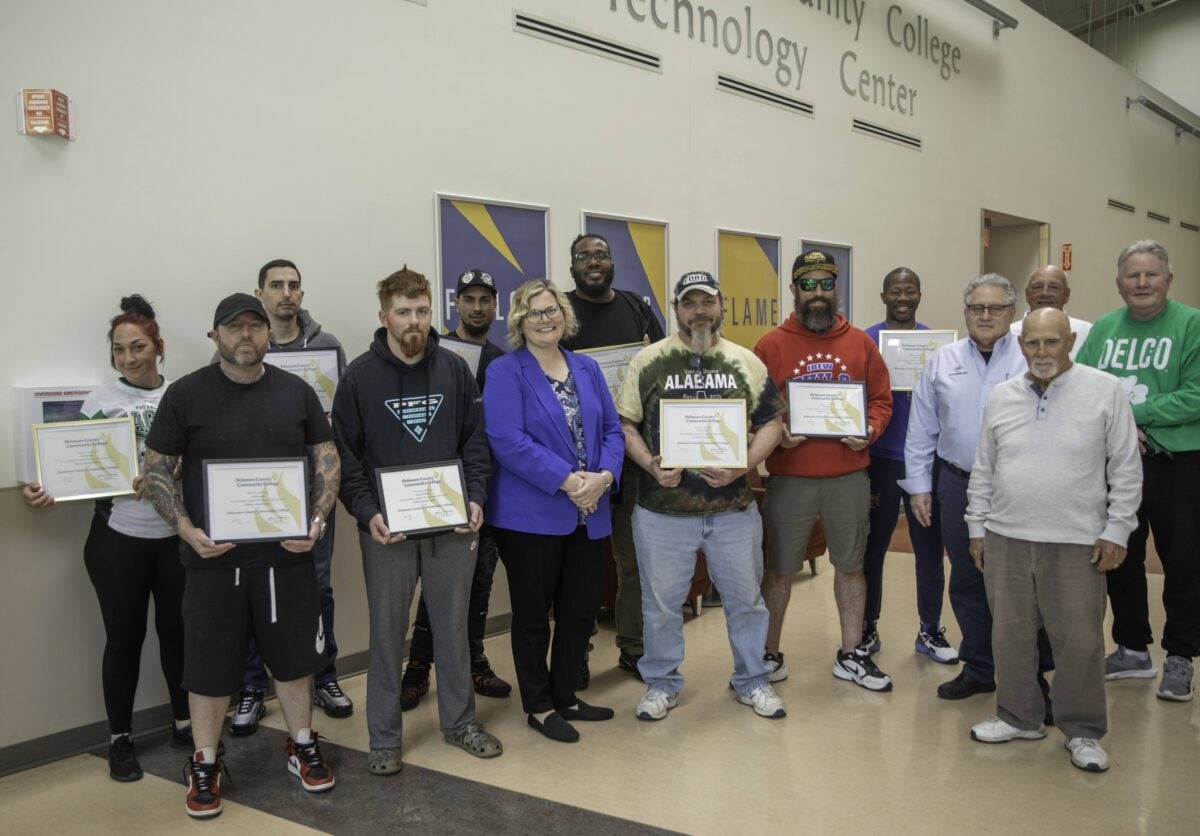
(Delaware and Chester Counties, PA)—The first cohort of students to take advantage of a new tuition-free welding training opportunity offered through Delaware County Community College and Philadelphia Works’ Good Jobs Challenge has completed DCCC’s Welding Certificate Program—and they are thrilled about their newly acquired skills.
“It was a great experience,” said student Andre Robinson of Brookhaven. “I feel confident that I know enough to give myself a chance in the field.”
“I personally learned a lot. This will help me be ahead of the game when I go for a job and will help a lot with my current job,” said student Mike McCollum of Drexel Hill, an assistant mechanic/operator at Merion Golf Club.
The 225-hour, 10-week hands-on training program delivers an introduction to welding and training in oxyfuel cutting, shielded metal arc welding, gas metal arc welding, blueprint reading and basic fabrication. These skills are in high demand and will prepare students for entry-level welding positions. Students in the Good Jobs Challenge cohort ranged in age from 21-59 and reside in Delaware County, Chester County, Montgomery County and Philadelphia.
“The students in this first cohort were highly motivated to learn a new trade,” said DCCC Welding instructor Salvatore Russomanno, an American Welding Society certified instructor and a professional welder for the past four decades. “They hung in there, had great class attendance and put the time in.”
Delaware County Community College is able to train up to 40 students to become entry-level welders at no cost through the Collegiate Consortium for Workforce and Economic Development, which was awarded $296,987 from the Economic Development Administration, U.S. Department of Commerce in support of the Philadelphia Works’ Good Jobs Challenge in Southeastern Pa. The first cohort began the program in January 2025 and the second in May 2025.
A partnership of the region’s community colleges and Drexel University, the Collegiate Consortium for Workforce and Economic Development provides high-quality training and education to business and industry in Greater Philadelphia. Together with six counties in Southeastern Pa., Philadelphia Works, the workforce development board of Philadelphia, launches training programs to build regional workforce skills within targeted growth industries, which include welding.
Employment opportunities for qualified welders are significant, according to the U.S. Bureau of Labor Statistics. Welders are especially in demand in Southeastern Pa. with the region’s economic reliance on shipping and shipbuilding, the aircraft industry, manufacturing and more. DCCC is a regional leader in the development and delivery of courses leading to professional certifications, certificates of competency and proficiency, and Associate in Applied Science degrees.
No college degree or previous training is required to participate in Philadelphia Works’ Good Jobs Challenge opportunities, which are designed to help drive economic growth and disrupt chronic multigenerational poverty across the region. The free, no-cost training takes place at DCCC’s Marple Campus.
The program is currently accepting applications for the third cohort, which begins in September. To learn more or enroll in the grant-funded, tuition-free Welding Certificate Program, visit https://philaworks.org/pa-good-jobs, call
This training for up to 40 entry-level welders was prepared by Delaware County Community College using federal funds under award ED22HDQ3070127 from the Economic Development Administration, U.S. Department of Commerce. The statements, findings, conclusions, and recommendations are those of the author(s) and do not necessarily reflect the views of the Economic Development Administration or the U.S. Department of Commerce.
 Admissions
Admissions  Financial Aid
Financial Aid Academic Divisions
Academic Divisions Academic Support Resources
Academic Support Resources Learning Commons
Learning Commons Academic Calendar
Academic Calendar Program Search
Program Search Course Information
Course Information Online Learning
Online Learning English Language Learners
English Language Learners Municipal Police Academy
Municipal Police Academy Beyond Associate Degrees
Beyond Associate Degrees Cooperative Education & Internships
Cooperative Education & Internships Academic Advising
Academic Advising Act 101 Program
Act 101 Program Campus Shuttle
Campus Shuttle CARE Team
CARE Team KEYS
KEYS New Students
New Students Parenting Students Resources
Parenting Students Resources Transfer
Transfer Student Employment Services
Student Employment Services Student Records
Student Records Student Resource Center
Student Resource Center Athletics
Athletics Campus Life
Campus Life New Student Orientation (NSO)
New Student Orientation (NSO) Online Classes
Online Classes Professional Development
Professional Development Community Education
Community Education Training & Certification
Training & Certification Prospective Students
Prospective Students Alumni and Giving
Alumni and Giving Veteran and Military Services
Veteran and Military Services Parents & Family
Parents & Family
